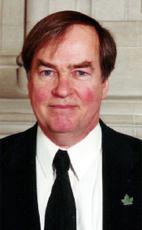Madam Speaker, I speak to this issue deeply troubled because I have listened to the debate this evening and the one thing that is very clear is there is no easy solution. Whatever way we go in this situation there will continue to be killing. There will continue to be strife in Yugoslavia and we will continue to be at risk with not only our soldiers but soldiers from other countries of the world.
I would like to look at a couple of points and express in my way how I feel about this dilemma. I am actually opposed to an air strike, certainly an air strike that is not tied to a strong show of ground forces. An air strike in Bosnia at this time might knock out some hardware but it will not knock out the Serbian troops gathered around the enclave.
I think the example of history tells us that the more an invading force is injured, the more likely it is to resort to atrocities when it finally does conquer. If the Bosnian Serbs suffer casualties from our air strikes there will be no doubt they will take their anger out on the Muslim civilians as soon as they occupy the city.
The other side of that equation is if we do not have an air strike what is the consequence of that? What we face then is sending a message to the Bosnian Serbs and any other peoples around the world who would like to resort, shall we say, to a military venture that we are helpless and they are able to do whatever they wish. We could expect to see this type of action spread around the world and certainly our chances of preserving the other five enclaves in the former Yugoslavia would be just about impossible.
Therefore, I do not envy the decision that is facing our ministers this night, nor the decision facing the other members of NATO as they wrestle with this very difficult decision.
Where do we go from here? Regardless of whether we have air strikes in Bosnia we are facing civil war. Again as an example of history, wherever you look in history, the absolute lesson is that you cannot intervene successfully in a civil war. The combatants in a civil war will fight it out.
I give the example of Afghanistan where the Soviet Union at the height of its power tried to intervene and it was a complete failure. It had to pull out. The classic example is Vietnam which really was a civil war all along. Again, one of the most powerful nations in the world failed to really effect any kind of outcome there.
There are many examples, Sri Lanka for one. What would we do in Sri Lanka? We cannot change the course of history in Sri Lanka. These are ethnic hatreds which we fought over. Rwanda is another one. What can we do there? What we are looking at here is a situation that is increasingly going to face the democracies of this world as the countries of the world resort to more and more tribalism and more and more ethnic fighting.
I would like to say something with respect to our 2,000 soldiers in the former Yugoslavia. I remind the government of Hong Kong and what happened there when we sent troops just before the Japanese declaration of war in 1941. Our Canadian troops fought bravely. When we look back on that incident we realize that they not only did not affect the outcome of the war, they did not affect the outcome of Japanese intentions. If anything, it cost more casualties. If there had not been a fight for Hong Kong there would have been fewer deaths in that area. We have to ask ourselves about that.
I strongly believe that the tradition of the Canadian troops is to be brave, to help the disadvantaged and to intervene but always as peacekeepers. I do not see us as a nation of combatants. I really do caution our government if it feels it is drawn into a situation where our troops may have to join with other NATO troops in a role that goes far beyond peacekeeping.
Finally, I would like to direct a comment toward the question of ethnic hatred. One thing that we should be very clear about is what is happening in Yugoslavia and we can take this to Afghanistan, Vietnam and many, many other countries is that we are not dealing with something that has anything to do with race, colour or visible minorities and we are not dealing with anything that necessarily has anything to do with religion. Muslims and Christians world-wide in many countries coexist most happily and indeed there is much in their religions that teaches them that they ought to cohabit.
What is happening in Yugoslavia is a return to the wrongs of the past. I think if you look at most ethnic fighting you will find it is because the people in the present are looking to the past and they are deriving the hatreds of the past. Instead of looking to the future or looking to the present and seeing what can unite them today, they look to the wrongs of long ago, sometimes even centuries ago.
What I would like to say in this debate is that I hope all of us worldwide, but most especially this country, take heed of that fact and remember not to look to the past for what went wrong and the wrongs we did to one another in the past, but to look to the future and what can unite us.

